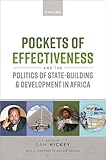Pockets of effectiveness and the politics of state-building and development in Africa / edited by Sam Hickey ; with a foreword by Merilee Grindle.
Publisher: Oxford, United Kingdom ; New York, NY : Oxford University Press, [2023]Copyright date: ©2023Description: xxi, 280 pages : illustrations ; 24 cmContent type:- text
- unmediated
- volume
- 9780192864963
- 0192864963
- 2000-2099
- Public administration -- Africa, Sub-Saharan -- Case studies
- Nation-building -- Africa, Sub-Saharan
- Economic development -- Political aspects -- Africa, Sub-Saharan
- Economic development -- Africa, Sub-Saharan
- Développement économique -- Afrique subsaharienne
- Reconstruction d'une nation -- Afrique subsaharienne
- Développement économique -- Aspect politique -- Afrique subsaharienne
- Economic development
- Politics and government
- Africa, Sub-Saharan -- Politics and government -- 21st century
- Afrique subsaharienne -- Politique et gouvernement -- 21e siècle
- Sub-Saharan Africa
- 320.967 23
| Item type | Current library | Call number | Status | Barcode | |
|---|---|---|---|---|---|
 Open Access Books - Publishers
Open Access Books - Publishers
|
National Law School | 320.967 (Browse shelf(Opens below)) | Available | OABP403 |
Includes bibliographical references and index.
Pockets of effectiveness and the politics of state-building and development in Africa / Sam Hickey and Kate Pruce -- Reconceptualizing the politics of pockets of effectiveness: a power domains approach / Sam Hickey and Giles Mohan -- Political settlement dynamics and the emergence and decline of bureaucratic pockets of effectiveness in Ghana / Abdul-Gafaru Abdulai -- 'Holding against the tide': the varying fortunes of bureaucratic pockets of effectiveness in Kenya / Matthew Tyce -- State capacity-building in Zambia amidst shifting political coalitions and ideologies / Caesar Cheelo and Marja Hinfelaar -- The politics of state capacity in post-genocide Rwanda: 'Pockets of effectiveness' as state-building prioritizations? / Benjamin Chemouni -- The politics of PoEs in Uganda: trapped between neoliberal state-building and the politics of survival? / Sam Hickey, Badru Bukenya, and Haggai Matsiko -- Comparative analysis: PoEs and the politics of state-building and development in Africa / Sam Hickey -- Pockets of effectiveness: afterwords and new beginnings / Julia C. Strauss -- From pockets of effectiveness to topographies of state performance? / Michael Rol
Why do certain parts of the state in Africa work so effectively despite operating in difficult governance contexts? How do 'pockets of bureaucratic effectiveness' emerge and become sustained over time? And what does this tell us about the prospects for state-building and development in Africa? Repeated economic and social crises have demanded that development thinkers and policy actors have had to engage with the critical role that states play in delivering development. Pockets of Effectiveness and the Politics of State-building and Development in Africa shows that politics is the driving factor that shapes how well state agencies perform their roles. It deploys a new conceptual framework - the power domains approach - to explore the shifting fortunes of key state agencies in five countries - Ghana, Kenya, Rwanda, Uganda, and Zambia - over the past three decades. Our original research reveals when, how and why political rulers decide to build effective state agencies and enable them to deliver certain forms of economic development - often through forming strategic coalitions with senior bureaucrats and with international support - and also when this support falters and gives way to a politics of survival. Comparative analysis identifies two potential trajectories towards state-building in Africa, each shaped by different configurations of social and political power. The book critiques the role that international development agencies have played in (mis)shaping the state in Africa and suggests a new strategic agenda for building the state capacities required to deliver sustained development at the current juncture. The book closes with critical commentaries from two leading scholars in the field, to help place our work in context and establish the next steps for research and strategy in this increasingly important area of development theory and practice.
There are no comments on this title.
